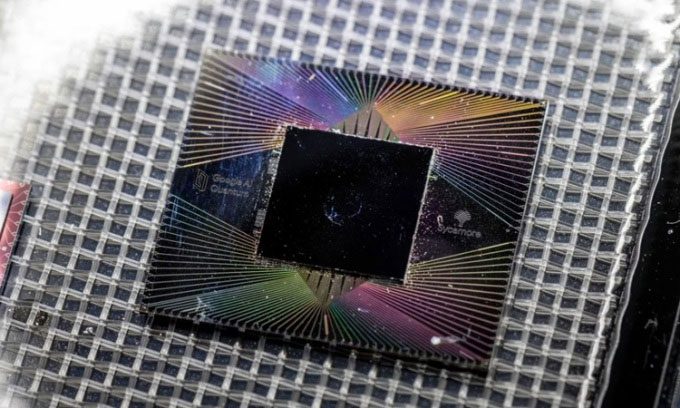Experiments conducted on Google’s Sycamore 67-qubit processor demonstrate progress into a “weak noise phase,” where computations are sufficiently complex to surpass supercomputers.
Quantum computers have the potential to outperform the fastest classical computers in specialized fields, according to groundbreaking experimental results. The Google Quantum AI research team discovered that a “complex and stable phase” can be achieved using available quantum processing units (QPUs). This means that when quantum computers enter this weak noise phase, they can perform complex calculations faster than the fastest supercomputers. Alexis Morvan, a quantum computing researcher at Google, and his colleagues announced the findings on October 9 in the journal Nature.

Google’s Sycamore Quantum Chip. (Photo: Cnet).
“We are focused on developing practical applications for quantum computers that cannot be conducted on classical computers,” a representative of Google Quantum AI stated. “This research marks a significant step in that direction. Our next challenge is to demonstrate a real-world impactful application.”
Quantum bits (qubits) in QPUs operate based on the principles of quantum mechanics to perform parallel computations, whereas classical computer bits can only process data sequentially. The more qubits a QPU has, the more powerful the machine becomes. Due to their parallel processing capability, calculations that would take thousands of years on classical computers can be completed in seconds with quantum computers.
However, qubits are susceptible to noise, meaning they are highly unstable and prone to errors when subjected to various influences, occurring at a rate of approximately 1 in 100 qubits compared to 1 in 1 quintillion bits. Examples of such influences include environmental factors like temperature changes, magnetic fields, or even radiation from space. The high error rate implies that to achieve quantum advantage, researchers need extremely sophisticated error correction technology or quantum computers with millions of qubits. Scaling up quantum computers is not easy; the largest number of qubits in a single machine today is only around 1,000.
The new experiment conducted by Google scientists shows that quantum computers can withstand current levels of noise and outperform classical computers in specific calculations. However, error correction remains essential as the machine scales up.
The research team employed a random sampling method known as random circuit sampling (RCS) to test the reliability of a 2D superconducting qubit network, one of the most common types of qubits made from superconducting metals cooled to near absolute zero. RCS serves as a measure of quantum computer performance compared to classical supercomputers.
The experimental results reveal that qubits can switch between an initial phase and a second phase referred to as “weak noise phase” by activating certain conditions. In the experiment on Google’s 67-qubit Sycamore chip, scientists increased the noise level or slowed the propagation of quantum correlations. In the weak noise phase, the computational processes are complex enough for them to conclude that quantum computers can outperform classical computers.




















































